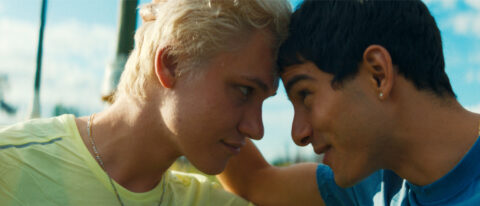Every year, European festivals are inundated with coming-of-age films that include social commentary, often with varying success. Recently, I discussed Block Pass (2024), a new drama by BAFTA TV award-nominated Antoine Chevrollier, with a friend. The film follows Jojo (newcomer Amaury Foucher), a closeted gay teenager who faces backlash from his rural French motocross community, as seen through the eyes of his best friend Willy (Sayyid el Alami).
My friend’s reaction summed up the film perfectly: “Wow, that sounds so vintage.”
To fully understand her point, one would need to delve into spoilers. But Block Pass leans on an outdated trope, using queer suffering to deliver a moral lesson about the dangers of toxic masculinity and homophobia.
The first hour of Block Pass dives into the complexities of a working-class, rural French community, capturing the persistent patriarchal norms that persist across generations. The film opens with an intense scene showing the machismo culture within the community, as we watch Jojo showing off for his mates with a daring stunt where he races through a stop light at a busy intersection. We catch a glimpse into these characters’ approach to life — Jojo’s got an impulsive and reckless streak, while Willy’s a bit more cautious and level-headed.
Shortly after, the film captures the intricacies of small-town life, from the gender dynamics at a celebratory barbecue to a fierce moment where a young woman confronts slut-shaming by local teens. In these early scenes, Chevrollier demonstrates a talent for immersive world-building through rich characterisations and a clear ear for dialogue. However, while the film adeptly navigates these societal issues, it occasionally relies on clichéd family dynamics. For instance, Willy’s struggles with his mother’s new partner, as well as Jojo’s father embodying the archetype of the hyper-competitive dad, feel somewhat familiar.
It’s perplexing why a film centred on exposing homophobia and bigotry in a machismo-dominated environment shifts its focus to a straight protagonist. While Willy, the straight lead, is reasonably affable, his tepid romantic subplot falls flat, and he gradually becomes a passive observer of the more critical developments.
Watching Willy witness what happens to Jojo, rather than experiencing the story from Jojo’s perspective, undermines the film’s impact. Jojo is a closeted motocross rider with a death drive who also happens to be banging a married man — this is a much more intriguing lead than Willy, who just needs to worry about his exams and get along with his mom’s new man.
Ultimately, it becomes a narrative about a straight man’s experience with homophobia, tidied up with a sort of “Remember that summer when all that bad shit went down? Oh well, off to my new life!” energy. Characters such as Jojo are worthy of being the center of their own story, instead of just bittersweet memories of a lesson learned.

Editor-at-large Jared loves movies and lives with Kiki in Berlin.




